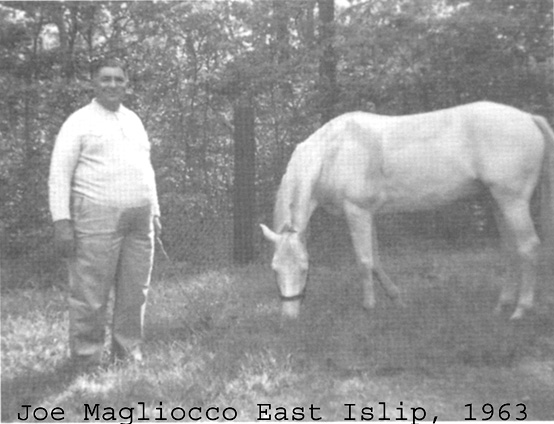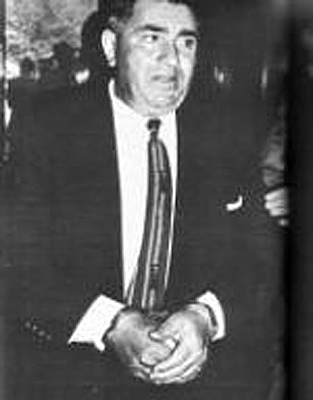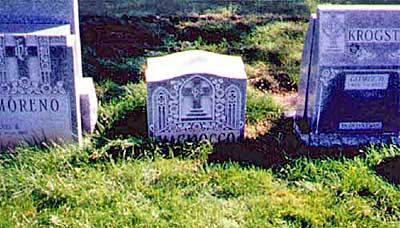Magliocco Estate
Ed’s Note: The following is an excerpt from ‘Bound by Honor’ a book written by Bill Bonanno, son of Joe Bonanno. This book is unremarkable in every way except for the parts where the old Magliocco Estate which used to be on Bayview Ave, is mentioned. Joe Magliocco was Bill Bonannos wife Rosalie's Uncle. They had come to him for Marital advice.
At that point, Magliocco suggested that we might like to stay with him for a while until we worked out what it was we really wanted to do. We both thought that might work. The estate was huge and there was plenty of room for our family, so the offer was gratefully accepted. But in that little twist and turn of finding a temporary residence, there were consequences far beyond the playing out of my marital problems. We moved into Magliocco's home precisely at the moment when his leadership of the Profaci Family became an explosive issue.
Magliocco's elevation happened to take place by an election of the captains within his Family. Because the Gallo revolt had so badly fractured the Family, that vote been called into question by New York leaders, particularly Tommy Lucchese, who had supported the Gallos, as well as by leaders such as Joe Zerilli of Detroit. With the heat coming down because of Valachi, it was harder and harder to take all of this to the table where it might have been mediated.
One day, Rosalie's cousin Sal arrived at the house in (East) Islip and told Magliocco that he was wanted at a Commission meeting m New Jersey. Magliocco foolishly decided to go. I say foolishly because it was absolutely clear that at that point, the Commission no longer had any standing and was only going to be loaded one way, with too many people being absent. Still, he went. He came back from the meeting in Camden and told me that the, Commission had made an edict that he had been illegally elected. Then they stripped him of his authority, fined him forty thousand dollars, and told him that he had thirty days to hold a new election. Because I was living in Magliocco's house at the time, my family and I became more caught up in the dispute than was necessary. I happened to be at home one night when Joe Colombo, Sonny Franzese, and Carmine Persico came over to discuss the results of the Commission meeting. I knew why they were there-it was obvious. Magliocco was well aware that such a meeting might create a dilemma for my Family and me. In fact, when these men turned up, he came to me and said, "Look, we have to make some decisions tonight, I don't want it to have nothing to do with you, and I don't want anybody to get ideas" I told him I understood and that I didn't want it to have anything to do with me either. I went upstairs and went to bed.
A
With that, I absented myself for the next-couple of days I made a trip up to Canada to speak with my father. I told him what-had happened and he asked me then what it was I wanted to do. What I really wanted to do, I said, was take my family and go back to Arizona and resume a regular life, but I now felt honor-bound to stay in New York and support Magliocco.
My father accepted this, but he was flabbergasted at the news of how Magliocco had essentially let himself
be maneuvered into a phony, Commission meeting where he wound up having to accept a decision to pay a fine and then to hold new elections in his Family. We decided nothing more at that point other than it was all
right, as far as he was concerned, for me to continue living at Magliocco's house, to make what decisions I felt I needed to make, and, above all, to be my father's eyes and ears in what, was obviously a dangerous and unpredictable situation. I returned to New York and continued to live at Magliocco's. I did not get into any extended discussions with him about what was going on. He did ask me at one point when I thought the troubles might start, and I told him that since he had been given
thirty days to hold new elections and come up with the forty thousand dollars, he was probably safe till then. But we never went into details. We were, after all, from different Families, we had our own affairs to look after, and it was important for both Families to keep their identities separate under the same roof.
The threat of impending violence however was impossible to ignore. Though Magliocco’s estate was huge and well protected, he became paranoid about security. There were phone stations all over the place, which he checked regularly to make sure no intruders had penetrated any of the electronic fences. Whenever he was going to use his car, which was parked in an area far below the hill in which the house was located, he first checked it to make sure it had not been wired with a bomb the night before. He did this by turning on the ignition
from a remote-control switch he had in the kitchen, which overlooked the driveway.
Magliocco was the kind of person who exuded danger and confidence. He was an enormous man, weighing maybe three hundred pounds or more, full of energy, and very decisive in his words and physical gestures.

He never seemed in doubt about anything, which probably accounted for his foolishly believing that he could walk into a Commission meeting designed to take his hide off and walk out unscathed.
In that frame of mind, he asked me one day to accompany him on a drive he was going to take. I knew that he was not talking about taking a trip to the market, but I didn't ask any questions-you don't in that kind of situation; you rely on the bond of trust and respect that makes words unnecessary. After Magliocco started the car from the kitchen, I went down to the driveway, slipped in behind the wheel, and waited for him. He came out of the garage a couple of minutes later carrying a shotgun. I knew then only that this little trip was a wartime move, but I didn't know it was offensive, defensive, or whatever. I assumed only that Magliocco wanted my help-that was enough. I asked him if I should go back in the house and get a piece for myself No, no, he said, everything was fine; there was no problem.
We drove in silence. I had no idea where we were going. Uncle Joe held the shotgun across his lap and I waited for him to tell me something. He directed me to drive to the Brentwood station of the Long Island Railroad and then asked me to pull over. For the next fifteen minutes or so, we just sat there until a train pulled in. We watched the people coming and going on the platform and then, suddenly, I saw someone I recognized. Sally ."the Sheik' Musacio, the father-in-law of Magliocco's nephew, walking slowly toward us. For a second, my mind clutched. I thought this was the guy Joe was going to hit. But that made no sense; he was an ally, a relative. What was going on? Just as casually as that. Sally came up to the car and nodded to me as Joe rolled down his window. The two men looked at each other. "Is everything set?” Magliocco asked him. “Yeah," Sally said, "'everything’s set.” Magliocco then said, "Okay, start." And that was that. Sally turned around and walked back to the station to take the next return train to New York. I knew then without asking - or being told, what had happened. This was a command to go to war. That is, for Magliocco's people specifically, to hit Tommy Lucchese and Carlo Gambino. In our world, when a decision of this magnitude is made, it is always made by face-to-face contact, never by phone, or by any other method-that might risk interception. I was there as an eyewitness for my father.
But the command never was carried out. Before a shot could be fired, Joe Columbo who was a captain in Magliocco's Family, went to Gambino and Lucchese and informed them of what had happened. He told them, too, of my presence at Magliocco's side. The war that never was became the conspiracy that still could kill.
Even though I was not involved in any plan to hit anyone, the Bonnano family and I suddenly were in up to our necks. The thought passed through my mind that
Magliocco had implicated me and my Family merely by having me at his side when he made this trip to the railroad station. I went with him because he had asked me to go and he was a friend and my wife's uncle, someone to whom I would not say no. I am sure he believed my presence in the car would not become known. But that was a careless mistake on his part, proof that he was not really up to the leadership role he had assumed, and it was a mistake on my part to have gone along out of a sense of
narrow loyalty and rigid responsibility.
At that moment in time, all of us, the Bonanno’s,
Magliocco, the Gallo’s, Tommy Lucchese, were caught up in something larger and more destructive than any of us singly or together might have imagined.
Then there was the question of the Bonannos. My father instructed me to talk directly with Tommy
Lucchese. I made plans to visit Lucchese at his home on Royatt Street in Long Beach, New York.
Three of us were assigned to visit him-my father's underboss, Johnny Morales, Gaspar
DiGregorio, and me. Before we left, Johnny took me by the arm. "Leave your weapon here, Bill, we're not going to have arms on us when we go in."
I looked at him as if he were crazy. "Do you know what you're doing?" I said. "That's the way it has to be," he answered. We rode out to Lucchese's house in silence, the tension in the car palpable. When we got there, I told
Johnny and Gaspar that I wanted to be the last one going in-so if anyone was waiting out in the street in a car or in a doorway, I would be able to move faster and confuse whoever was there. My mind was going a hundred miles an hour. We were shown in by a woman someone I didn't know. But that was a good sign. If we were going to be whacked, cut up, carried out in body bags, there would be no women in the house.
We were shown into a large parlor. A serving of anisette cookies was already arranged on a plate. There was a smell of freshly brewed espresso in the elaborately decorated room. A coupla of minutes later, a door opened and Tommy and one of his captains, Carmine Gribbs, and his underboss, Stephen Lasalla, came striding into the room. As usual, Tommy was impeccably dressed. We exchanged pleasantries. As protocol dictated in a meeting of this kind, Johnny Morales, because he was the highest-ranking member of our Family, did the talking. He explained to Luchese that there were rumors about me being tied to Magliocco and that they were false. He explained something about my personal problems and about Rosalie and I living in the house. That was the only reason I had happened to be in Magliocco's company, he said. Tommy smiled in that hooded way of his and nodded. He said that never for a moment did he believe that I would enter into a conspiracy against him. He expressed regret at my domestic situation and he gave a little speech about family values. And then we all embraced and it was over.
Except that by that point, neither Tommy Luchese nor, Joe Bonanno, nor anyone else in our world, for that matter, could prevent what was coming.
The meeting at the railroad station occurred in the early fall of 1963; the meeting with Luchese took place shortly after that. On November 22, John F. Kennedy was shot in Dallas, and Magliocco died soon after that.
Uncle Joe Magliocco, getting out of bed one morning suffered a fatal heart attack. The whole question of his role as a leader was settled by one blow of fate. The leadership of his Family would soon fall into the hands of Joe Columbo. It had been quite a fall.


These 2 pics courtesy of Brian McGowan
Editors Note: It seems that some of the Wainscotting panels and other pieces of the interior of the Second William Nicoll house found their way into the Magliocco house through its previous owner, Frances Livingston.